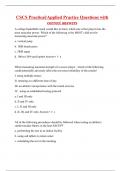REVISION
A-Level Sociology
, CRIME, DEVIANCE,
SOCIAL ORDER AND
SOCIAL CONTROL
,FUNCTIONALISM
Explanations of Crime
4 Key Functions • To generate and sustain morality: Right and wrong. Jimmy Saville.
Durkheim • To reaffirm boundaries: How far is too far. Stephen Lawrence.
• To promote social cohesion/unity: for example, 9/11 or Rosa Parks (collective
sentiments)
• To encourage social change: for example, votes for women following the
suffragettes, security changes following 9/11, Saville & safeguarding
Safety Valve • Certain crimes are the lesser evil i.e. smaller crimes can prevent larger
Davis (1961) crimes or social breakdown
or Polsky • Polsky argues that child porn/prostitution should be legal to avoid
major molestation/rape
AO3: this could lead to/incentivise the consequence by giving people a
flavour of it.
• Crimes can highlight a dysfunction in society that needs to be addressed
Crimes as a
• For example, suicide rates on the increase which leads to a dysfunction
Warning for the NHS and solutions would be better education or better suicide
Clinard & Cohen prevention lines
Society is Organised • The true function of some social control agencies maintains
to Commit Crime crime rather than rid it e.g. police having quotas
Erikson (1969)
• Society is made to maintain crime e.g. festivals and drugs
Bond Theory • People are less likely to commit crime because of four types of socia
Hirschi control
— Attachment: community, family, friends
— Commitment: job, future, children, what you have to lose
— Involvement: time to commit crime
— Belief: personal/religious values
H/E white collar crime often sees people having all bonds but still
commit crime
AO3
• Ignores the view of the victim: despite crime having a positive function, people still die
• Does all crime lead to social solidarity: George Floyd & racism/terrorism & islamaphobia,
or rape and female isolation rather than cohesion leading to other deviances
, STRAIN THEORY: FUNCTIONALISM
Explanations of Crime
Strain Theory • People commit crime as they are unable to achieve socially approve
Merton goals through legitimate means. These goals were described as the
‘American Dream’
• Society promotes itself as meritocratic and anyone can achieve their
goals e.g. money is earned through studying hard/work and power is
achieved through associating and impressing the right people
Why can’t these • Structural issues: unequal access to resources and opportunities
Goals be • Cultural issues: not having legitimate means to achieve goals e.g.
Achieved? present-time orientation
Responses to • People turn to criminal methods to achieve the AD as a result of the
Strain pressure applied to them by society
• People respond different based on their stratification:
— Conformity. Follows the AD legitimately, law-abiding.
(accepts goal and means)
— Innovation. Wants AD. Rejects hard work to get there.
(accepts goal but not means)
— Ritualism. AD doesn’t matter but want to lead a law-abiding life.
(rejects goal but accepts means)
— Retreatism. Social drop-outs, anarchists.
(reject goal and means)
— Rebellion. Makes own AD
(replace goal and means)
Criticisms of • Deterministic: assumes people commit crime if they have strain
Strain • Ignores those who have AD but still commit crime i.e. fraud
• Assumes a value consensus: are we all striving for money, crime and
status?



